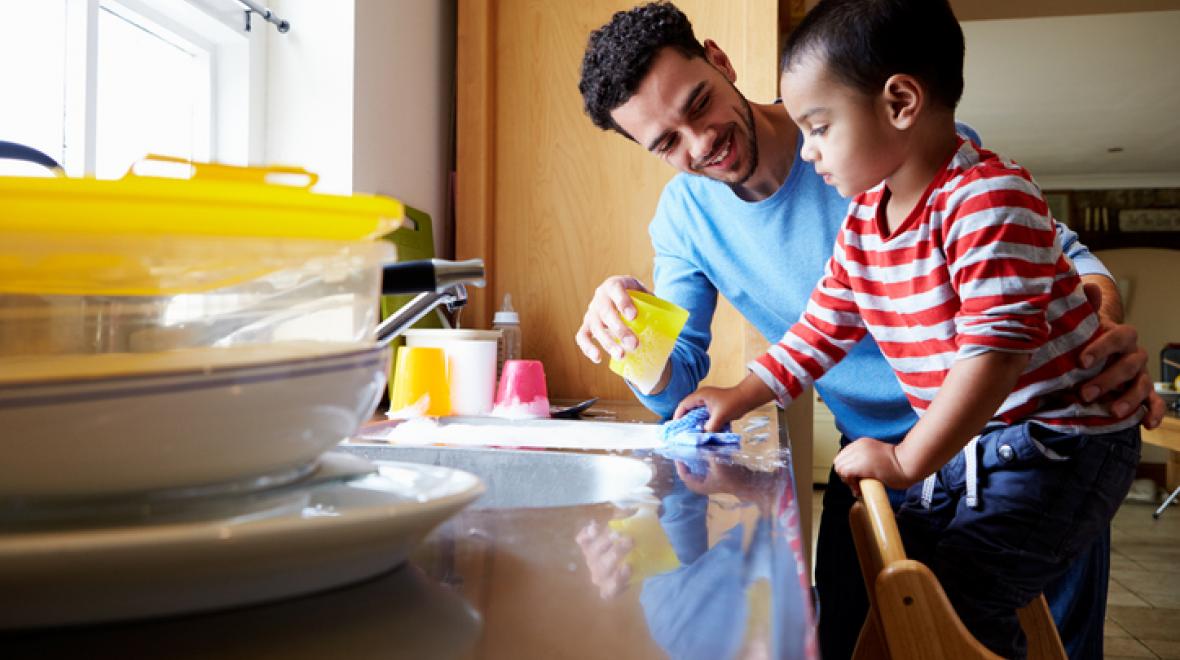
A year ago, parent Sarina Behar Natkin celebrated a milestone: her 9- and 12-year-old daughters officially took over all dinner clean-up duties. Her friends asked, “How did you do that?” Her reply: It was a four-year-process and no magic was involved.
Although Natkin is a parent coach, she says it is possible for any parent to retire from dinner clean-up duties in due time.
“Chores done by our children will eventually help us, but it’s like teaching our kids to walk. It’s something they need to learn, and it’s going to take a long time before they can run,” she says.
Whether your kids are toddlers or teens, frame chores as part of the work of being a family, says Natkin.
“I don’t get paid for housework; there’s work to do that’s just part of living. If they want their garbage collected as adults, they are going to need to take the garbage out,” she adds.
That’s right: Natkin doesn’t believe chores should be incentivized through payment for services rendered. During a family meeting when her daughters were 4 and 7, they made a list of all the things it takes to run a family, from laundry to paying for car insurance. She remembers the moment their eyes went wide with the realization that they paid a mortgage. Starting that year, each girl picked one skill to learn, and they pick a new task on every birthday.
“Alfred Adler [a psychiatrist who developed individual psychology] said the primary goals of being human is to feel a sense of belonging and connection, along with a sense that we matter. Even when our grumpy kids give us push back, chores are a concrete way to put in structure: Their work and presence matters; it helps our family run,” says Natkin.
If your kids are older, still make that list of essential household chores. You can present it casually during dinner or even during a family road trip. Natkin suggests being matter of fact and only talking about chores when everyone (including you) is in a good mood. Say, "I know you have a lot on your plate. I need some help now that summer break is almost here."
More buy-in happens when chore talks are a conversation instead of a lecture. How would they create a chore chart? If they want to earn money, are there chores that rank above daily household tasks that you’re willing to pay for? Think about how you’d treat someone who works for you — offering respect and viewing them as a capable human being — and leave micromanaging behind, says Natkin.
“At my house, parents are allowed to offer one tip when a chore is complete, but no more than that. Like, “It's nice to wipe the sink out after the dishwasher is loaded,” says Natkin. “Most days, people are content enough to come to work in a respectfully run family business, but you’ll have to give a pass on bad days because these are your kids.”
That leads to the other rub when it comes to making sure kids do chores. They don’t need to sing while they vacuum, but you are the person who needs to teach them how to vacuum. Natkin says training takes four steps, and it usually takes longer than you think it should:
- I do the chore, they watch
- I do, they help
- They do, I help
- They do
Lastly, thank your kids every time they complete a chore. Perhaps this sounds like overkill, but do you recall the last time someone thanked you for making dinner? Um, yeah, receiving gratitude feels fantastic. Why not add goodwill to the daily chore grind? Here’s to hoping more appreciation comes your way, too.
What to have them do whenOf course, every child will vary in their ability to complete various chores at every age, but here’s a brief list of age-appropriate task ideas.
|











